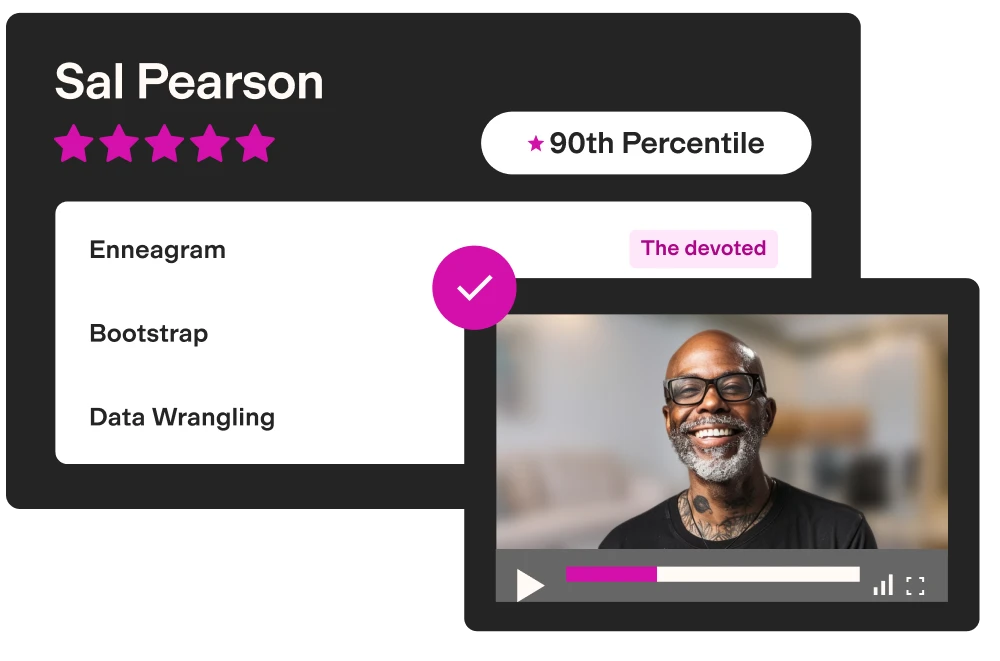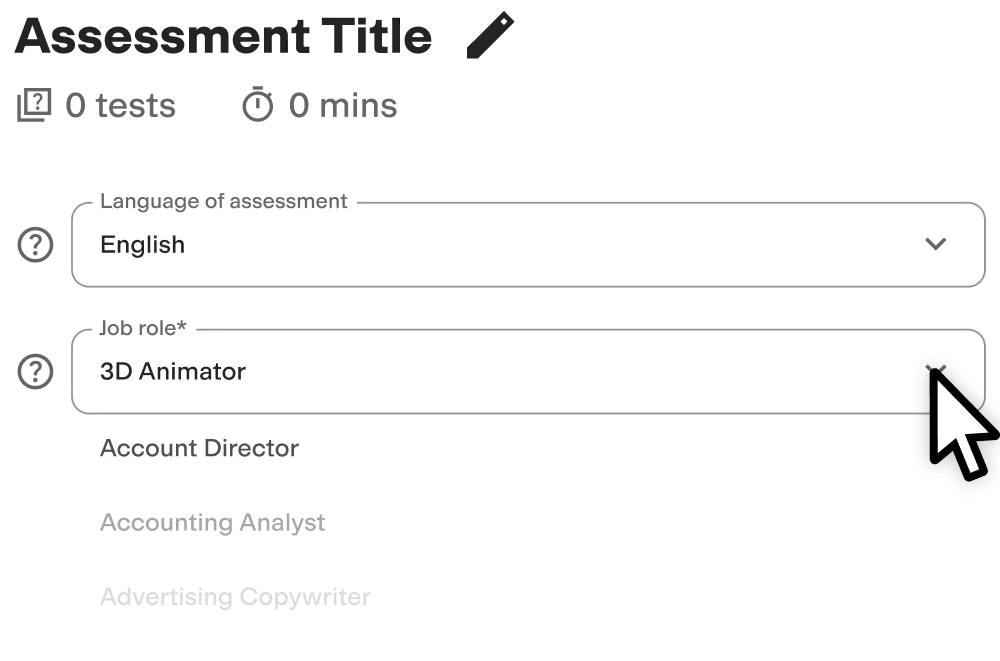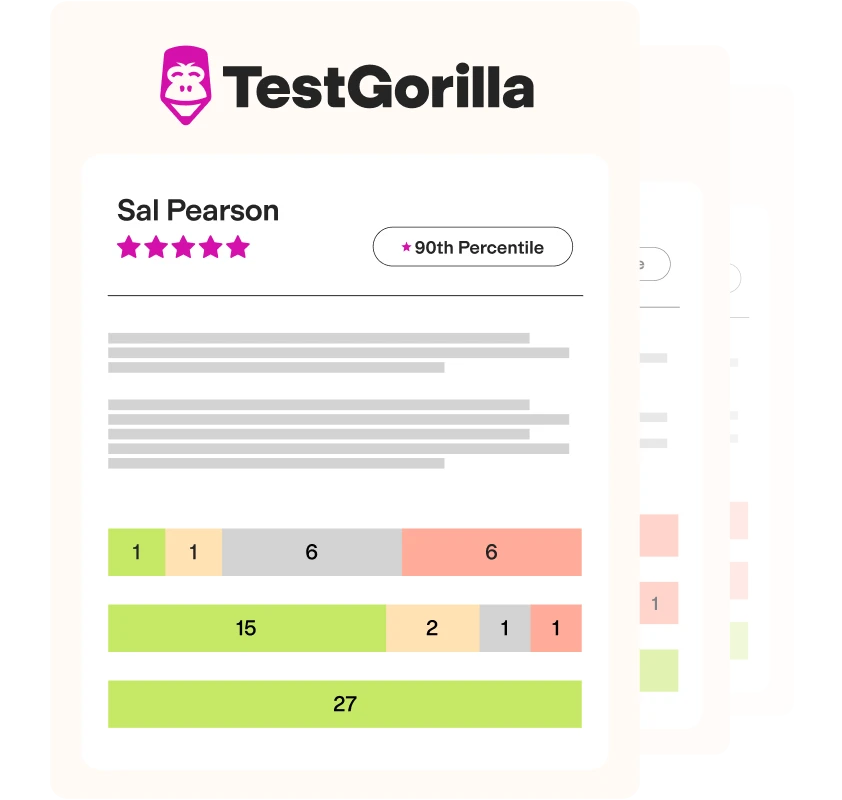Artificial intelligence test
Summary of the Artificial Intelligence online test
This Artificial Intelligence test evaluates candidates’ understanding of core AI concepts and their ability to solve situational AI tasks. This screening tool helps you identify candidates capable of developing machine learning models, implementing natural language processing algorithms, and optimizing predictive analytics for various business applications.
Covered skills
Local search and navigating uncertain environments
Game theory and constraint satisfaction problems
Propositional and first-order logic
Automated planning and robotics
Use the AI skills assessment test to hire
Data scientists, data analysts, data engineers, artificial intelligence engineers, reinforcement learning specialists, and game developers and programmers.
About the Artificial Intelligence test
This Artificial Intelligence test evaluates candidates’ knowledge of fundamental AI concepts for developing and maintaining AI technologies. You can use this AI test to discover how proficient your applicants are in:
Local search: Finding methods that incrementally adjust parameters to return the best outcome within a broad set of possibilities
Environments with uncertainty: Understanding and making decisions in situations where all variables are not known or predictable, which is common in real-world AI systems
Games and constraint satisfaction problems: Developing strategies to solve complex puzzles and competitive scenarios by meeting specific criteria, benchmarks, and constraints
Propositional and first-order logic: Using basic and complex logic to form, manipulate, and test statements and hypotheses
Automated planning and robotics: Creating sequences of actions for autonomous tasks and designing robots to perform these tasks
The Artificial Intelligence test questions focus on fundamental concepts of AI that form the foundational knowledge of machine learning, deep learning, and reinforcement learning.
Applicants who perform well on this Standardized test for AI Skills have an intermediate knowledge of core artificial general intelligence approaches. They can work with different types of information, tackle complex AI tasks, and streamline data processing systems to support real-time analytics and decision-making in your organization.
You can check the preview questions to explore sample Artificial Intelligence test questions.
The test is made by a subject-matter expert
TestGorilla’s tests are created by subject matter experts. We assess potential subject-matter experts based on their knowledge, ability, and reputation.Before being published, each test is peer-reviewed by another expert, then calibrated using hundreds of test takers with relevant experience in the subject.
Our feedback mechanisms and unique algorithms allow our subject-matter experts to constantly improve their tests.
Gary R.
Gary has been working in the data science field for more than three years and is proficient in the fields of machine learning and data analysis. He has a Bachelor’s degree in Economics and a Master’s degree in Computer Science. The combination of those two fields helps Gary to achieve even greater results.
He is fond of computer science and loves to work on projects related to Artificial Intelligence which is, in his opinion, the future of our world.
Use TestGorilla to hire the best faster, easier and bias-free
Our screening tests identify the best candidates and make your hiring decisions faster, easier, and bias-free.
Create high-quality assessments, fast
Building assessments is a breeze with TestGorilla. Get started with these simple steps.
Why are AI skills important to employers?
AI skills are important to employers because they support the automation of business processes, help companies gain insights through data analysis, and improve customer and employee engagement.
Using AI Recruiting Skill tests to hire professionals with knowledge of AI can help you:
Boost efficiency: Employees with strong AI skills can develop and implement systems that automate routine tasks
Save time and money: By automating and optimizing computer programs, tasks, and processes, AI professionals help reduce operational costs
Improve strategic planning: AI experts use machines’ abilities to analyze large datasets and uncover valuable insights important for better business decisions
Support innovation: AI skills can lead to more innovative products and services
Increase scalability: AI experts create scalable applications that ensure the long-term sustainability and adaptability of your business
Improve customer experience: AI technologies, such as large language models and LaMDA chatbots, support customer satisfaction and engagement
3 artificial intelligence competencies to look for
AI skills are essential for hiring AI developers capable of producing scalable applications with high usability and adaptability. Here are the three in-demand AI skills you need to pay attention to:
Machine learning: Look for candidates who can design, implement, and refine predictive models that automatically improve their accuracy over time without being additionally programmed
Deep learning: Search for proficiency in modeling complex data patterns using advanced neural networks
Reinforcement learning: Seek applicants who can develop systems that learn optimal actions through continuous feedback
What job roles can you hire with our standardized test for AI skills?
If your company relies on AI or machine intelligence to stay competitive, you can use our AI Skills assessment test to improve technical hiring for these roles:
Data scientists use machine learning and deep learning techniques to analyze complex data sets to come up with valuable insights
Data analysts apply AI-driven data processing and analysis to interpret and turn data into business strategies
Data engineers build and maintain strong data infrastructure
AI engineers use deep learning, AI research, and automated planning to design and implement AI applications that solve complex problems
Reinforcement learning specialists apply reinforcement learning techniques to create advanced algorithms that continuously improve through trial and error
Game developers and programmers integrate AI and decision-making models into interactive game environments for better user experiences and gameplay dynamics
Using this test when hiring for AI proficiency can help you significantly improve your business outcomes. For example, Orbit Technologies used our talent assessments to hire people for data science and engineering roles.
The company found people with the right mix of technical skills, soft skills, and attitude, which improved the quality of hires and reduced instant attrition rates by 50%.
Create a multi-measure assessment: 4 tests to pair with the Artificial Intelligence online test
Skills-based hiring works best with a multi-measure approach because it enables you to evaluate skills, personality traits, and aptitude. With TestGorilla, you can create talent assessments with up to five different skill tests that measure your candidates’ capabilities and traits, giving you a holistic understanding of your candidates.
For a more objective hiring process, combine our AI pre-employment test with these four assessment tools:
Reinforcement Learning test: Evaluate your candidates’ abilities to optimize algorithms for complex problem-solving, which complements the AI test by assessing their capacity for adaptive learning and decision-making
Data Science test: Assess proficiency in statistical analysis and data manipulation to ensure your candidates can handle large datasets required for effective AI applications
Critical Thinking test: Determine how well your applicants use logic and reason to solve problems in tech environments, verifying they can apply their AI knowledge to practical, real-world challenges
Motivation test: Understand what drives your candidates and how likely they are to feel fulfilled in their new role to confirm they align with your company’s AI goals and vision
To quantify these benefits and understand the potential return on investment (ROI) of skills assessments such as this AI test, you can use our ROI calculator.
FAQs
View a sample report
The Artificial Intelligence test will be included in a PDF report along with the other tests from your assessment. You can easily download and share this report with colleagues and candidates.







